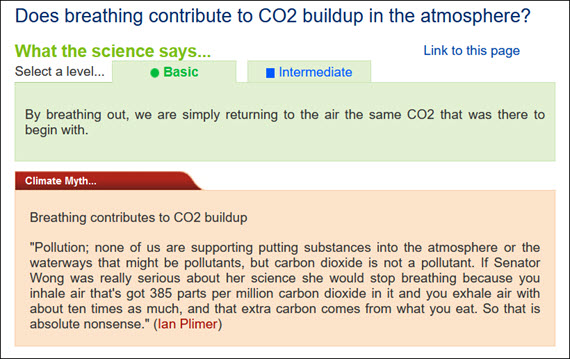At a glance - Does breathing contribute to CO2 buildup in the atmosphere?
Posted on 12 December 2023 by John Mason, BaerbelW
On February 14, 2023 we announced our Rebuttal Update Project. This included an ask for feedback about the added "At a glance" section in the updated basic rebuttal versions. This weekly blog post series highlights this new section of one of the updated basic rebuttal versions and serves as a "bump" for our ask. This week features "Does breathing contribute to CO2 buildup in the atmosphere?". More will follow in the upcoming weeks. Please follow the Further Reading link at the bottom to read the full rebuttal and to join the discussion in the comment thread there.

At a glance
We, and almost all of our relatives in the animal kingdom, are aerobic. That means we all depend on this simplified equation in order to function:
glucose + oxygen → carbon dioxide + water + energy
We breathe in oxygen and that oxidises carbohydrates in our body's cells. That chemical reaction gives us the energy required to perform all the varied tasks we do, from blinking to running a marathon. The products of the process are carbon dioxide and water. While the air we breathe in contains just under 420 ppm CO2, what we breathe out contains 40,000-50,000 ppm CO2, a hundredfold increase due to the simplified equation above.
Because we are breathing constantly, this rapid gas-exchange with our surroundings is also constant and, while each of us live, is perpetual. We are part of the fast carbon cycle that involves the movements of carbon through the living world. Of course, the living world also includes plants. Plants take in carbon dioxide to react in the presence of sunlight with the water in their cells. That, in a nutshell, is photosynthesis, the process responsible for the plant-based carbohydrates we eat.
We are vastly outnumbered in terms of carbon biomass by the plant kingdom. Of the estimated nearly 500 billion tonnes of biomass carbon on Earth, the animals account for just 0.4% whilst the plants represent 90%. No wonder that the graphs of measured CO2 levels show an annual fluctuation, forming a symmetrical wobble. The wobble represents the Northern Hemisphere seasons because that's where most of Earth's land masses are found. In the growing season when the plants are busy photosynthesising, CO2 falls, only to rise again in the dormant season. The annual wobble is like the heartbeat of the planet, a regular rhythm along the rising slope that represents our emissions from fossil fuel burning.
Let's imagine a world without fossil fuel-burning. The annual wobble from the seasonal growth and dormancy of plants would be superimposed upon a near-flatline of CO2 levels over human lifetimes. Only occasional events, occurring over tens of thousands to many millions of years, would perturb that near-flatline. That's because there is a second, slow carbon cycle that operates over geological time-scales. In the geologic past, sudden changes in CO2 levels have occurred, primarily due to volcanism on a scale no human, living or dead, has ever witnessed. The fossil record tells us the outcome has never been good.
Fossil fuels are part of the slow carbon cycle. They represent one of several long-term geological reservoirs in which carbon gets locked away. But because we are digging or pumping fossil fuels from the ground and burning them, it is the slow carbon cycle that we are interfering with. No other species has ever intentionally interfered with the slow carbon cycle: this is a first on Planet Earth in its 4.5 billion year long existence. The person quoted in the myth box above is a geologist. He should know better.
Please use this form to provide feedback about this new "At a glance" section. Read a more technical version below or dig deeper via the tabs above!
Click for Further details
In case you'd like to explore more of our recently updated rebuttals, here are the links to all of them:
If you think that projects like these rebuttal updates are a good idea, please visit our support page to contribute!































 Arguments
Arguments






























Ian Plimer: "If Senator Wong were really serious about her science she would stop breathing..." Not unless Senator Wong is eating 'Coal-Coal-Puffs' for breakfast, Professor 'I'm-Really-Serious-About-My-Science'.